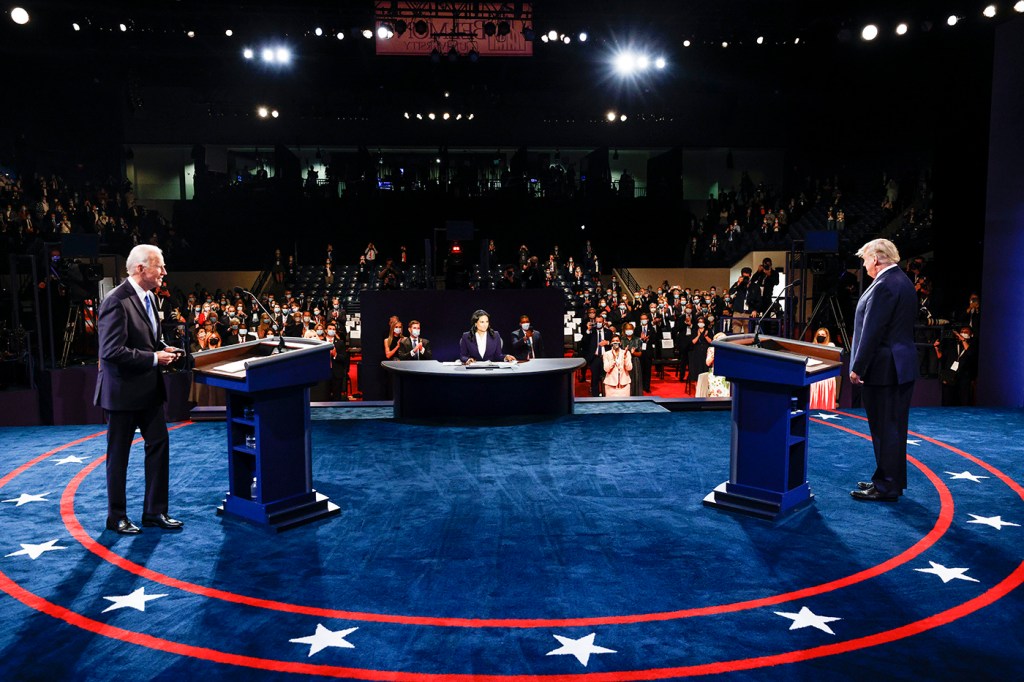Here’s why President Donald Trump failed to ‘rock the boat’ in his debate with Joe Biden

The second and final presidential debate on Thursday was not a game-changer, according to Nicholas Beauchamp, assistant professor of political science at Northeastern. Though Donald Trump practiced relatively courteous behavior, Beauchamp said that the president failed to cut into Joe Biden’s lead in a meaningful way.
“Trump did better than in the previous debate,” Beauchamp said. “He came across as a more normal politician. Biden’s goal was to just not rock the boat.”

Photo by Matthew Modoono/Northeastern University
Trump, who is trailing by almost 10 points in a weighted averaging of the national polls, was hoping for a debate performance that would shift the momentum his way. But a record level of early voting is complicating the president’s hopes for a comeback: More than 40 million people have already voted, in-person or by mail, in advance of the Nov. 3 election.
The tone of this meeting in Nashville, Tennessee, was far more respectful and courteous than the first debate of Sept. 29, when Trump repeatedly interrupted Biden. The president’s aggression emerged as a self-inflicted wound: It combined with his Oct. 1 diagnosis of COVID-19 to elevate Biden in national polling.
“It’s usually hard enough to get Trump to change his behavior,” Beauchamp said. “So there must have been a fairly strong message that got back to him from the previous debate.”
The Commission on Presidential Debates responded by changing its rules in order to silence a candidate’s microphone while his opponent was answering the moderator’s initial questions. But the mute button turned into a non-story as the moderator, Kristen Welker, an NBC News anchor and White House reporter, maintained firm control of the discourse. The candidates’ interruptions were limited to the impassioned back-and-forth that has long been typical of presidential debates.
Beauchamp noted that the evening began with the president trying to strike an optimistic tone while insisting that a vaccine was imminent and that his administration was “rounding the corner” in its control of the COVID-19 pandemic. Biden, in spite of his typically optimistic outlook, opened with an attack on Trump’s handling of the coronavirus, which has killed more than 220,000 people in the U.S.
“Anyone who’s responsible for that many deaths should not remain as president of the United States of America,” Biden said. “We’re about to go into a dark winter—a dark winter—and he has no clear plan.”
While more than 80 percent of Republicans approve of Trump’s response to the coronavirus, he has struggled to gain support beyond his base. A weighted average of national polls shows that 53 percent of Americans are “very worried” about the pandemic’s effect on the U.S. economy, and close to 60 percent overall disapprove of Trump’s handling of the pandemic.
Beauchamp was struck by how the two candidates changed their tone as the night wore on.
“There was some pretty vivid dark and negative imagery from Biden in the beginning,” Beauchamp said. “But by the end they reversed themselves.”
Trump concluded by predicting that a Biden administration would incite a U.S. economic depression, whereas Biden spoke of confronting systemic racism and creating new jobs.
At times the president tried to characterize himself as a Washington outsider while referring to Biden as a career politician who was “all talk and no action.” It was a winning perspective for Trump in 2016. But Beauchamp said Trump has had a harder time with such comparisons this year because of his own record as president—as well as the fact that Biden is more popular than Hillary Clinton, the 2016 Democratic nominee.
The two candidates accused each other of being influenced by foreign governments. They sparred with equal predictability over healthcare, climate change, and racism in the U.S. One relatively new topic was the recent news that the Trump administration has been unable to unite 545 immigrant children with their parents after they had been separated at the Mexican border.
“Before this year, that was one of the larger issues that had political effects on the voting opinions or judgments of Trump,” Beauchamp said. “It speaks especially to swing voters and suburban women, even with the overwhelming effects of COVID-19 and the Black Lives Matter movement.”
Beauchamp was struck by Biden’s willingness to distance himself from left-wing positions on healthcare (he wants to maintain private insurance), climate change (he does not fully support the Green New Deal), or fracking (he insists he will not ban it), which is an important issue in central Pennsylvania, a crucial swing state.
“He’s not afraid of differentiating himself from the left,” Beauchamp said. “I think he believes he’s got that coalition pretty well sewn up.”
For media inquiries, please contact media@northeastern.edu.






